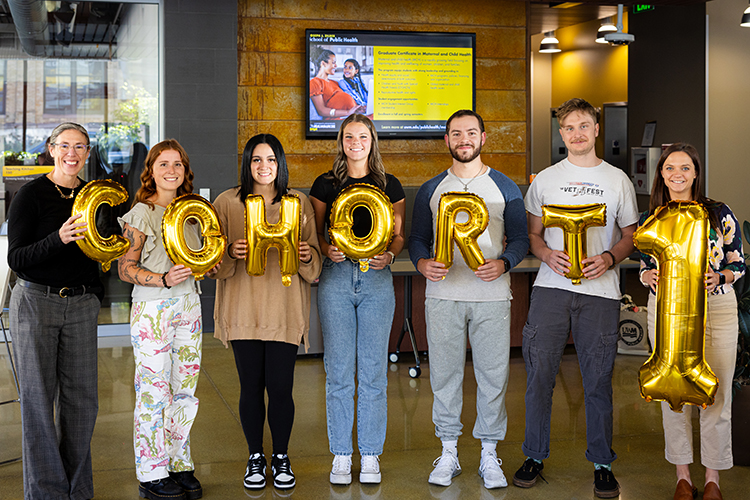
Lori Klos (left), associate professor, and Stephanie Send, clinical assistant professor (right), celebrate with the first cohort of students in the new MPH Nutrition and Dietetics program at UWM: Delaney Ortiz (from left of Klos), Cianna Colon, Erica Brincka, David Jakubek and Zachary Long. Not pictured is Lora Taylor de Oliveira, clinical associate professor. (UWM Photo/ Elora Hennessey)
This fall, UW-Milwaukee (UWM) is offering a brand-new master’s of public health (MPH) degree track in nutrition and dietetics that will prepare graduates to be eligible to take the exam needed to become a registered dietitian nutritionist (RDN). It is one of only two master’s programs in dietetics available in the Milwaukee area.
Effective January 2024, those who take the RDN exam must have a master’s degree, according to the Accreditation Council for Education in Nutrition and Dietetics (ACEND).
“The RDN credential ensures that the student has completed rigorous coursework and more than 1,000 hours of supervised experiential learning from an ACEND-accredited program,” said Lori Klos, associate professor and director of UWM’s Nutritional Sciences undergraduate program and the new MPH-Nutrition and Dietetics program.
UWM has offered a bachelor’s degree in nutritional sciences for many years, but students pursuing a bachelor’s degree in other disciplines also are eligible to apply once they complete a set of prerequisite courses.
Klos recently spoke about this new graduate program and explained some of the career options open to those interested in nutritional sciences and dietetics.
What are some of the careers that require an RDN credential?
One career that requires the RDN credential is clinical dietetics, which includes practice in both acute and ambulatory health care settings. Clinical RDNs provide evidence-based medical nutrition therapy tailored to the specific needs of the individual in the treatment or prevention of disease. RDNs are crucial members of the multidisciplinary team and often work alongside doctors, nurses, pharmacists and many other health care professionals.
For example, an RDN can provide guidance to patients going through chemotherapy as part of cancer treatment by helping them navigate an array of complex side effects such as nausea and taste changes.
An RDN also can help individuals newly diagnosed with Type 2 diabetes by providing education on how food choices and eating patterns can be adapted to keep their blood glucose within safe limits, while still enjoying food. RDNs may also recommend and monitor nutrition support and vitamin/mineral regimens for patients who can no longer eat by mouth and require nutrients to be provided through a tube or IV. An RDN is often part of a health care team treating patients with complex conditions such as eating disorders or infants born prematurely.
What are some examples outside of medical specialties?
RDNs, particularly those with a public health focus, can work to improve food and nutrition security. Anti-hunger organizations often employ dietitians as part of a team to help improve community food availability and accessibility.
Some RDNs specialize in food systems management and find employment at schools or universities. RDNs develop menus and manage budgets, keeping a balance of nutritional value and cost. They also take into consideration dietary restrictions and food preferences when designing those menu options.
Many collegiate and professional sports teams rely on an RDN to help calibrate their fueling needs to maximize athletic performance. Food companies involve RDNs in product development and consumer testing, branding and marketing, and navigating nutrition labeling and health claim regulations.
What is truly unique about the RDN credential is that there are endless career paths and opportunities. An RDN can leverage their education and training to also pursue a career in medical sales, entrepreneurship, research and more.
Students with an undergraduate degree in nutritional sciences who do not want to pursue the RDN credential also have an array of employment options. UWM Nutritional Sciences alumni have found jobs in nutrition communications, education or as health/wellness coaches. Some may find work in food service management or recipe testing and quality control. Those with an interest in public health can work in government-based programs such as the Women, Infants, and Children program.
What’s unique about UWM’s master’s program?
It’s delivered in the framework of public health. This valuable combination is not widely available, which is why we are thrilled to be bringing this program to UWM.
By completing over 240 hours of supervised experiential learning focusing on public health nutrition with multiple community organizations, our students will be well-equipped to advance social justice and respond to food and nutrition challenges faced by individuals and communities which may be exacerbated by social inequities.
We’re planning to use the new Ziemer nursing simulation lab with these students to build their clinical skill set, such as performing a physical assessment to look for signs of nutrient deficiencies, placing feeding tubes and taking blood pressure in a realistic, hospital-like setting.
Several of our cohort slots are reserved for those who pursue undergraduate academic programs at MATC and UWM. Through the generous donation of the Zilber Family Foundation, we are able to defray the cost of attendance by providing scholarships to many incoming and returning students.
This program embraces food and size inclusivity. The students are educated to look at the whole picture to help their clients navigate the complex food environment. Health is important, but so is making ample space for opportunities to share delicious, nourishing, judgement-free meals that can connect us to each other and our heritage.
We are proud to offer a Milwaukee-focused program and are eager to help make a meaningful difference in the lives of those in Milwaukee County and southeastern Wisconsin.
Written by Laura Otto
Link to original story: https://uwm.edu/news/new-masters-degree-prepares-students-to-become-registered-dietitians/
